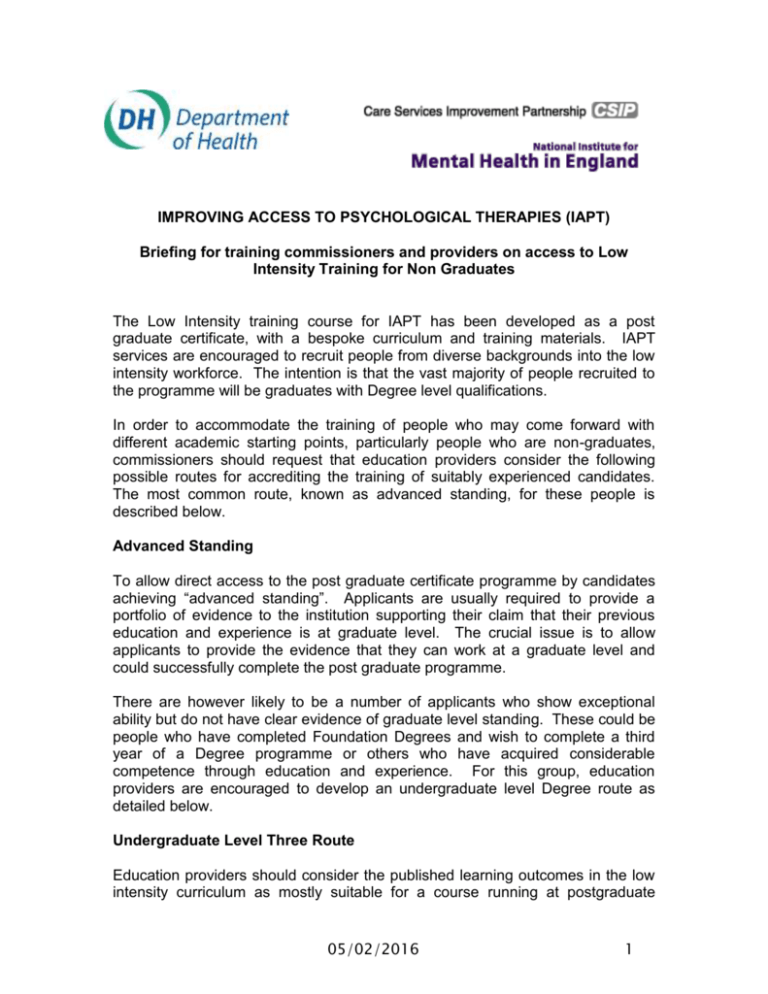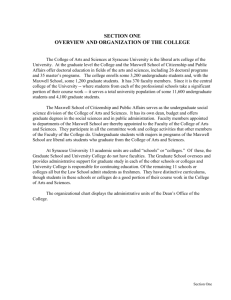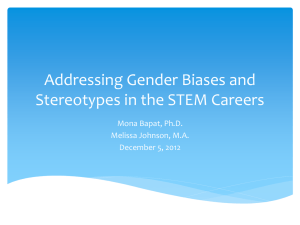Low Intensity Training for Non Graduates
advertisement

IMPROVING ACCESS TO PSYCHOLOGICAL THERAPIES (IAPT) Briefing for training commissioners and providers on access to Low Intensity Training for Non Graduates The Low Intensity training course for IAPT has been developed as a post graduate certificate, with a bespoke curriculum and training materials. IAPT services are encouraged to recruit people from diverse backgrounds into the low intensity workforce. The intention is that the vast majority of people recruited to the programme will be graduates with Degree level qualifications. In order to accommodate the training of people who may come forward with different academic starting points, particularly people who are non-graduates, commissioners should request that education providers consider the following possible routes for accrediting the training of suitably experienced candidates. The most common route, known as advanced standing, for these people is described below. Advanced Standing To allow direct access to the post graduate certificate programme by candidates achieving “advanced standing”. Applicants are usually required to provide a portfolio of evidence to the institution supporting their claim that their previous education and experience is at graduate level. The crucial issue is to allow applicants to provide the evidence that they can work at a graduate level and could successfully complete the post graduate programme. There are however likely to be a number of applicants who show exceptional ability but do not have clear evidence of graduate level standing. These could be people who have completed Foundation Degrees and wish to complete a third year of a Degree programme or others who have acquired considerable competence through education and experience. For this group, education providers are encouraged to develop an undergraduate level Degree route as detailed below. Undergraduate Level Three Route Education providers should consider the published learning outcomes in the low intensity curriculum as mostly suitable for a course running at postgraduate 05/02/2016 1 level. Education providers may need to rewrite some learning outcomes using suitable language to provide the course at undergraduate level. Commissioners and providers should note the following:o The skills based competency assessments are ‘neutral’ in terms of academic level. Therefore, all students must pass these as defined in the curriculum, whichever academic level they are studying at. o Academic assessments are presented and marked at different levels. Different exams and assignments need to be written for undergraduate and postgraduate course and marked according to the regulations and examinations framework of the university/education provider. o It is satisfactory to teach students who are studying at different levels in the same classroom. In general, this is regarded as perfectly acceptable for students who are studying course validated one academic level apart. o If institutions are validating and teaching under the post graduate course alongside each other it will be necessary to amend some of the learning outcomes to distinguish between the two courses. o For individuals completing this route they are likely to need further undergraduate level work before being able to pursue the High Intensity post graduate training. Individuals with Foundation Degrees who also passed the level 3 programme would not be so restricted. The above are two possibilities which allow non-graduates to access low intensity training programmes. These may not be the only possibilities and education providers may be able to find other ways to allow access which would be in the interests of all. Not all institutions may have the flexibility to accommodate nongraduate entry routes into LI Courses, and commissioners may have to accept graduate-only courses, particularly within the first twelve months. 05/02/2016 2











